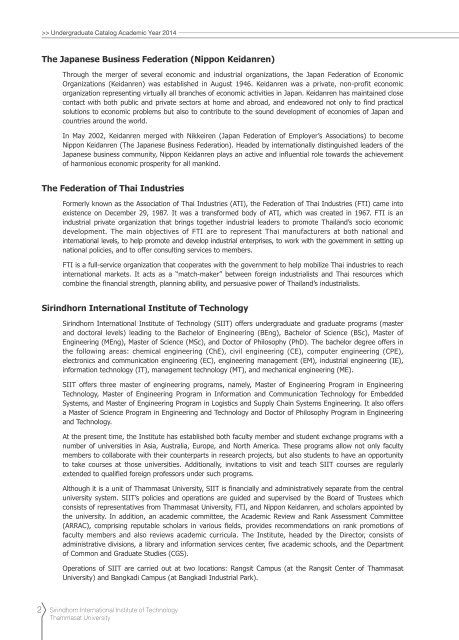undergrad2014
undergrad2014
undergrad2014
You also want an ePaper? Increase the reach of your titles
YUMPU automatically turns print PDFs into web optimized ePapers that Google loves.
Undergraduate Catalog Academic Year 2014<br />
The Japanese Business Federation (Nippon Keidanren)<br />
Through the merger of several economic and industrial organizations, the Japan Federation of Economic<br />
Organizations (Keidanren) was established in August 1946. Keidanren was a private, non-profit economic<br />
organization representing virtually all branches of economic activities in Japan. Keidanren has maintained close<br />
contact with both public and private sectors at home and abroad, and endeavored not only to find practical<br />
solutions to economic problems but also to contribute to the sound development of economies of Japan and<br />
countries around the world.<br />
In May 2002, Keidanren merged with Nikkeiren (Japan Federation of Employer’s Associations) to become<br />
Nippon Keidanren (The Japanese Business Federation). Headed by internationally distinguished leaders of the<br />
Japanese business community, Nippon Keidanren plays an active and influential role towards the achievement<br />
of harmonious economic prosperity for all mankind.<br />
The Federation of Thai Industries<br />
Formerly known as the Association of Thai Industries (ATI), the Federation of Thai Industries (FTI) came into<br />
existence on December 29, 1987. It was a transformed body of ATI, which was created in 1967. FTI is an<br />
industrial private organization that brings together industrial leaders to promote Thailand’s socio economic<br />
development. The main objectives of FTI are to represent Thai manufacturers at both national and<br />
international levels, to help promote and develop industrial enterprises, to work with the government in setting up<br />
national policies, and to offer consulting services to members.<br />
FTI is a full-service organization that cooperates with the government to help mobilize Thai industries to reach<br />
international markets. It acts as a “match-maker” between foreign industrialists and Thai resources which<br />
combine the financial strength, planning ability, and persuasive power of Thailand’s industrialists.<br />
Sirindhorn International Institute of Technology<br />
Sirindhorn International Institute of Technology (SIIT) offers undergraduate and graduate programs (master<br />
and doctoral levels) leading to the Bachelor of Engineering (BEng), Bachelor of Science (BSc), Master of<br />
Engineering (MEng), Master of Science (MSc), and Doctor of Philosophy (PhD). The bachelor degree offers in<br />
the following areas: chemical engineering (ChE), civil engineering (CE), computer engineering (CPE),<br />
electronics and communication engineering (EC), engineering management (EM), industrial engineering (IE),<br />
information technology (IT), management technology (MT), and mechanical engineering (ME). <br />
SIIT offers three master of engineering programs, namely, Master of Engineering Program in Engineering<br />
Technology, Master of Engineering Program in Information and Communication Technology for Embedded<br />
Systems, and Master of Engineering Program in Logistics and Supply Chain Systems Engineering. It also offers<br />
a Master of Science Program in Engineering and Technology and Doctor of Philosophy Program in Engineering<br />
and Technology.<br />
At the present time, the Institute has established both faculty member and student exchange programs with a<br />
number of universities in Asia, Australia, Europe, and North America. These programs allow not only faculty<br />
members to collaborate with their counterparts in research projects, but also students to have an opportunity<br />
to take courses at those universities. Additionally, invitations to visit and teach SIIT courses are regularly<br />
extended to qualified foreign professors under such programs. <br />
Although it is a unit of Thammasat University, SIIT is financially and administratively separate from the central<br />
university system. SIIT’s policies and operations are guided and supervised by the Board of Trustees which<br />
consists of representatives from Thammasat University, FTI, and Nippon Keidanren, and scholars appointed by<br />
the university. In addition, an academic committee, the Academic Review and Rank Assessment Committee<br />
(ARRAC), comprising reputable scholars in various fields, provides recommendations on rank promotions of<br />
faculty members and also reviews academic curricula. The Institute, headed by the Director, consists of<br />
administrative divisions, a library and information services center, five academic schools, and the Department<br />
of Common and Graduate Studies (CGS).<br />
Operations of SIIT are carried out at two locations: Rangsit Campus (at the Rangsit Center of Thammasat<br />
University) and Bangkadi Campus (at Bangkadi Industrial Park).<br />
2 Sirindhorn International Institute of Technology<br />
Thammasat University


